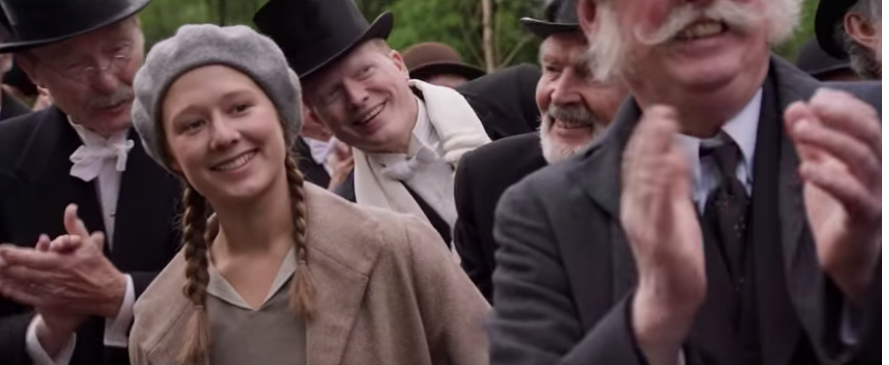Anyone familiar with the beloved children’s book character Pippi Longstocking should know the name Astrid Lindgren, the author of the popular series. Lindgren’s own coming-of-age is recounted in the recent Swedish film, Becoming Astrid, and the question of how she so fully encapsulates the childhood experience is answered.
Alba August stars as a teenage Astrid, wide-eyed, fair-skinned and shamelessly fun-loving. August somehow delivers a performance of an instantly-likable character that a viewer can not only root for, but also relate to. When Astrid tells snippets of made-up fairy tales for her siblings, you want to hear the ending. When she’s unbothered that boys overlook her at a local dance class, you want to get up and dance alongside her when she chooses to dance alone.
As a budding young writer, Astrid is recognized for her intellect and work ethic and is offered an opportunity to intern at the local newspaper, The Vimmerby Times. Watching her timidly tap the keys of a typewriter for the very first time with glee and gusto is one of the film’s purest and most memorable scenes.
However, from here, the plot muddles in one of the most grating ways.
The editor of the newspaper, Blomberg (Henrik Rafaelsen), recognizes Astrid’s beauty beneath the surface through her workplace success and carefree, bright demeanor. Their work relationship grows until it becomes sexual, and Astrid ends up pregnant.
And thus, the tired-out, ever-frustrating narrative — a young girl being taken advantage of by a man with power, forced to give up everything for him to make his life slightly more convenient and is then blamed for the negative impact is has on her — ensues.
The plotline that made the film enticing — Astrid’s growth as a writer — takes a tragic backseat to the drama following Astrid as she’s forced to put her son in foster care to salvage Blomberg’s reputation as he’s still technically married to his wife.
The woman who raises Astrid’s son in Denmark, Marie (Trine Dyrholm), passionately and convincingly plays a character who is just and giving, and acts almost like a moral compass to Astrid. Though she is not frequently shown on-screen, her impact holds much power over the plot.
Astrid’s complex relationship with her mother (Maria Bonnevie) is also dynamic in its own way, as her mother’s seemingly harsh motives are softened over time as Astrid matures into motherhood and begins to see her in a more humanizing way.
Although this film is a coming-of-age story, it is difficult to watch at times. Astrid has her youth violently stripped away from her, her hopes of becoming a writer paused while she is robbed of the early joys of motherhood because Blomberg won’t allow her to raise her own son.
However, what makes this film worth getting through is Astrid. From her first appearance on-screen, the sense of fondness the viewer feels toward her is unwavering.
Though Astrid faces many conflicts and moral dilemmas during her formative years, watching her learn that her stories are what draw people to her is a priceless experience and a lesson worth learning.
3.5/4 Shells



